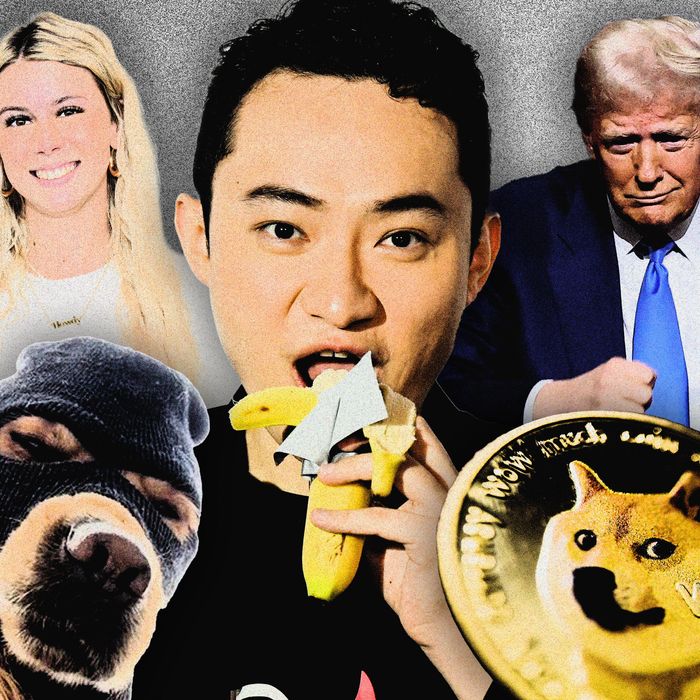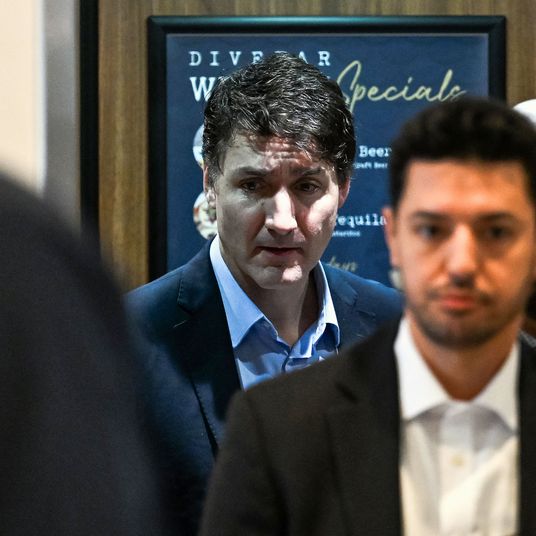
The cryptocurrency market is unfathomably hot right now. A meme coin named after an act of enthusiastic oral sex briefly peaked with a market cap near $500 million earlier this month. Another coin with no utility whatsoever, called Fart Coin, has a market cap of close to $1 billion— roughly the same value as Marshalls or the Kuwaiti International Bank.
Longtime bitcoin holders are even cashing out now that the commodity has breached $100,000, converting their long-holds into Rolexes, BMWs, and private-jet excursions. One cryptocurrency whale, 34-year-old Justin Sun, dropped $6.2 million on the Maurizio Cattelan piece called Comedian that was a banana duct-taped to a gallery wall. “It challenges traditional notions of value and creativity in a way that mirrors the disruptive nature of blockchain and cryptocurrency,” Sun wrote to explain his interest in the piece. Then he ate the banana — “part of continuing the artwork’s story and paying tribute to its ephemeral nature,” Sun wrote. “By doing so, I hope to inspire conversations about value, art, and the power of shared experiences in both the physical and digital worlds.” Then he felt bad that the Upper East Side street vendor who originally sold the banana to the artist sold the fruit for just a quarter, so he offered to buy 100,000 bananas, which proved to be a logistical nightmare for the vendor, who wouldn’t see the profit anyway because he didn’t own the fruit stand. Then Sun bought over $200 million of ethereum.
There is one man to thank for all this speculation: Donald J. Trump. The president-elect, who once tweeted that bitcoin was “based on thin air,” has become the savior of decentralized finance, with bitcoin investors and meme-coin bettors thrilled by his newfound acceptance of their asset class. On Election Day, six weeks ago, bitcoin traded at $68,000. After Trump won, even institutional traders were advising to “buy everything you can” in crypto-world, confident that the incoming president would kill regulatory enforcement and treat this economy strictly as an engine for growth. So far, the bet has paid off. Bitcoin is a rising tide that has lifted all sorts of lesser assets that were thought to have been mostly left behind when the Biden administration cracked down on the last cryptocurrency free-for-all in 2022.
We have now entered Crypto Sicko Mode. After years of complaining that the federal government was trying to kill off the industry, it is roaring with raw confidence. As with the appeal of Donald Trump himself, they have considered the consequences and have chosen to ignore them and do it all again.
NFTs of apes are selling for five figures again. Crypto executives are shuttling to Mar-a-Lago to join the corporate knee-bending extravaganza at the president-elect’s resort. A new wave of crypto ETFs — the easy-to-invest, passive version of a mutual fund — are expected to launch next year, expanding the market for nonbelievers. Razzlekhan, a notorious crypto figure from the last hype cycle, is posting again. Rug pulls and alleged pump-and-dumps appear to be back.
The $HAWK coin launched by podcaster Hailey Welch, who became one of the most famous people of 2024 after she answered a man-on-the-street interviewer asking about “one move in bed that makes a man go crazy,” soared close to a $500 million market cap then promptly lost all of its value when the majority of its tokens were sold. This has all the hallmarks of a very bad thing. Welch told Fortune the whole thing was “not just a cash grab” before her manager intervened to say that “we don’t want to break securities laws.” In an emailed explanation, crypto attorney Yuriy Brisov wrote that Welch could find herself in a “precarious” situation if regulators found that $HAWK is in fact a security. “Welch could find herself in hot water for offering unregistered securities,” he wrote. “The rapid rise and fall of the coin’s value also raises questions about potential market manipulation, a practice frowned upon by regulatory bodies worldwide.”
In one of the most telling examples of the hot market, a Republican congressman, Mike Collins, just bought north of $2,000 of a meme coin called Ski Mask Dog. Collins, one of the House’s most strident backers of cryptocurrency, did not respond to questions about why he bought an asset that has no core value beyond building an online community around a golden retriever in a balaclava. One supporter on X explains why he thinks its value will go up: “It’s the first non-cartoon looking dog that gives off the cool gritty vibe that 20-30yr old dudes in crypto could really rally behind.”
“This always comes around when bitcoin pumps, because then you have every other person talking about crypto,” says a 30-something user named Unlock Crypto who helps run Ski Mask Dog’s social media. “Now my siblings, my aunts, my friends, they all carry us. They’re all slowly trying to figure out how to get in it before everyone is in it. I think that’s a good sign.” The Ski Mask Dog market cap currently hovers around a quarter-billion dollars.
Figures a little closer to the incoming cabinet expect that the Trump bitcoin bump is here to stay. J. Christopher Giancarlo, the chairman of the Commodity Futures Trading Commission for the first two years of the first Trump administration, anticipates an end to “regulation by enforcement” from “openly crypto-hostile regulators” at the Securities and Exchange Commission led by outgoing chair Gary Gensler — the man who was tasked by the Biden administration to clean up cryptocurrency. The day Trump nominated his new pick, Paul Atkins, investors responded by buying enough bitcoin to launch it north of $100,000 for the first time ever. This is because the first time Atkins was SEC commissioner — his last term ended a month before the Lehman Brothers collapse in 2008 — he was big on deregulation. Also, he currently serves as a board member for a crypto lobbying group.
Giancarlo also expects that Trump’s follow-through on campaign promises will seal the deal, like the formation of a crypto council. Crypto executives from companies once charged by the SEC are currently lining up to help influence the executive branch’s approach to their own industry. Trump’s other promises also include the creation of a strategic national reserve of bitcoin — an idea he reiterated last week — and a potential end to capital-gains taxes on crypto transactions.
If the crypto industry at large is foaming at the mouth to make money and gain influence during the new Trump administration, they are not alone. Howard Lutnick, the incoming Commerce secretary, has spent years advising the controversial crypto giant Tether — which is being looked closely at by the Treasury and Justice departments due to the fact that groups ranging from Hamas to Russian arms traffickers find it really easy to use for money laundering. According to business associates who spoke with The Wall Street Journal, Tether’s founder has said this year that he expects Lutnick to use his standing to influence government actions against his company.
Trump himself has denied claims that he intends to profit from his second stay in the White House. The potential conflicts of interest are already here. In early December, Justin Sun — the guy who ate the million-dollar art banana — invested $30 million in Trump’s extremely useless cryptocurrency play World Liberty Financial. (The company does not allow buyers to sell its tokens on a secondary market, advising investors that their purchase is “non-transferable indefinitely.”) That purchase price tripped a switch in the company’s financial terms that allows Trump and his family to receive 75 percent of that net revenue. Crypto skeptics worry that this is another way for rich people who are in trouble to influence the president-elect. (Last year, Sun and his company, TRON, were sued by the SEC over allegations of fraud and market manipulation. He has denied wrongdoing.)
After discussing Trump and cryptocurrency with Giancarlo for a while, I asked him: Do you think that the 78-year-old president-elect understands all this?
“He’s not what the industry calls ‘crypto native,’” he said. “What I would say about Trump, having served during his first term, is that it’s all about economic growth. I believe he views crypto the same way he views AI, the same way he views nanotechnology, the same way he views quantum computing, the same way he views fracking and other new energy-extraction methods — as all leading to enhanced economic growth.”
It has become cliché to say, but that is all the industry really wants. Trump keeps doubling down on that promise. “We’re gonna do something great with crypto,” he said at the New York Stock Exchange last week. “Others are embracing it and we want to be ahead.”































